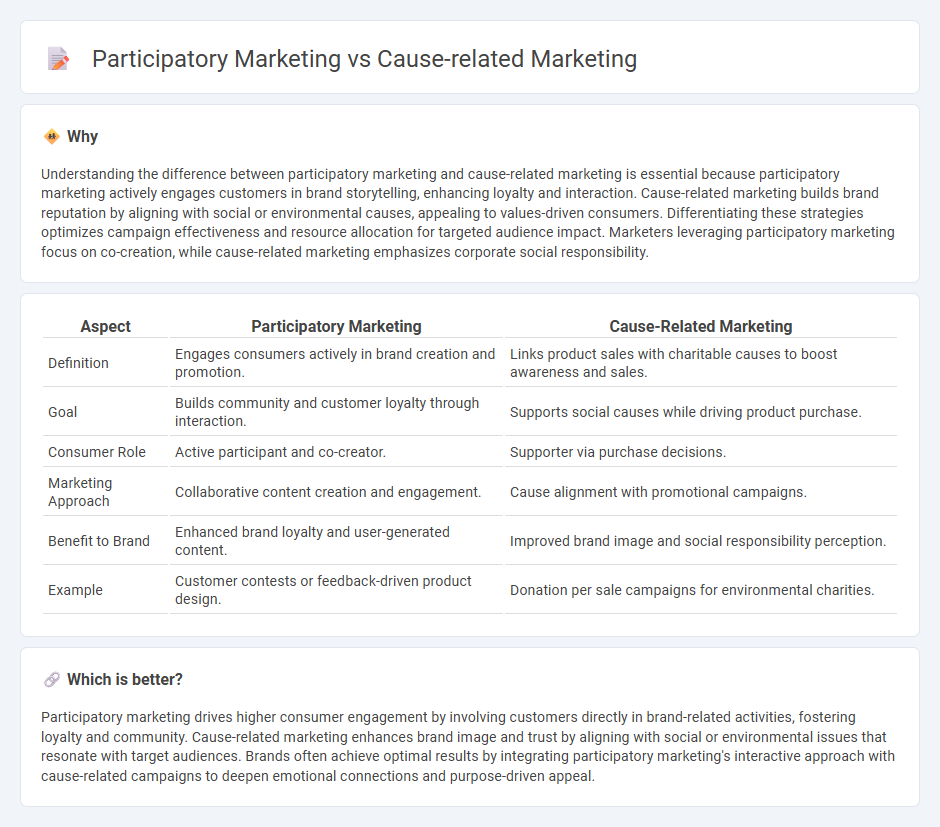
Participatory marketing engages customers directly in brand experiences, fostering interaction and community involvement to enhance loyalty and word-of-mouth promotion. Cause-related marketing aligns a company's brand with social or environmental causes, driving consumer support through shared values and corporate social responsibility. Explore the differences and benefits of these strategies to elevate your marketing approach.
Why it is important
Understanding the difference between participatory marketing and cause-related marketing is essential because participatory marketing actively engages customers in brand storytelling, enhancing loyalty and interaction. Cause-related marketing builds brand reputation by aligning with social or environmental causes, appealing to values-driven consumers. Differentiating these strategies optimizes campaign effectiveness and resource allocation for targeted audience impact. Marketers leveraging participatory marketing focus on co-creation, while cause-related marketing emphasizes corporate social responsibility.
Comparison Table
| Aspect | Participatory Marketing | Cause-Related Marketing |
|---|---|---|
| Definition | Engages consumers actively in brand creation and promotion. | Links product sales with charitable causes to boost awareness and sales. |
| Goal | Builds community and customer loyalty through interaction. | Supports social causes while driving product purchase. |
| Consumer Role | Active participant and co-creator. | Supporter via purchase decisions. |
| Marketing Approach | Collaborative content creation and engagement. | Cause alignment with promotional campaigns. |
| Benefit to Brand | Enhanced brand loyalty and user-generated content. | Improved brand image and social responsibility perception. |
| Example | Customer contests or feedback-driven product design. | Donation per sale campaigns for environmental charities. |
Which is better?
Participatory marketing drives higher consumer engagement by involving customers directly in brand-related activities, fostering loyalty and community. Cause-related marketing enhances brand image and trust by aligning with social or environmental issues that resonate with target audiences. Brands often achieve optimal results by integrating participatory marketing's interactive approach with cause-related campaigns to deepen emotional connections and purpose-driven appeal.
Connection
Participatory marketing enhances consumer engagement by involving customers directly in brand activities, creating a sense of community and shared purpose. Cause-related marketing aligns brand values with social or environmental causes, strengthening emotional connections and increasing brand loyalty. Together, they boost authentic consumer participation while promoting meaningful causes, resulting in heightened brand trust and social impact.
Key Terms
Cause-related marketing:
Cause-related marketing connects brands with social or environmental causes to boost brand image and consumer loyalty by highlighting corporate social responsibility (CSR). This marketing strategy often involves donations, sponsorships, or partnerships with non-profit organizations to drive sales and create positive social impact. Explore how integrating cause-related marketing can enhance your brand's authenticity and customer engagement.
Corporate Social Responsibility (CSR)
Cause-related marketing aligns brand campaigns with social or environmental causes to enhance Corporate Social Responsibility (CSR) and build consumer trust through purpose-driven initiatives. Participatory marketing engages customers directly in CSR activities, fostering community involvement and co-creation, which strengthens brand loyalty and authentic social impact. Explore further to understand how these marketing strategies amplify CSR efforts and drive sustainable business growth.
Brand-Charity Partnership
Brand-charity partnerships in cause-related marketing drive consumer engagement through monetary contributions and co-branded campaigns that align a company's product with a social cause, enhancing brand reputation and customer loyalty. Participatory marketing within these partnerships emphasizes consumer involvement and interaction, encouraging audiences to actively support charitable initiatives via social media challenges, events, or user-generated content, fostering a deeper emotional connection and community building. Explore how integrating both approaches can maximize impact and boost your brand's social responsibility presence.
Source and External Links
What is Cause Marketing? - Cause-related marketing is a strategic collaboration between businesses and nonprofits that benefits both by increasing brand awareness, building customer trust, and supporting social causes through mutually beneficial campaigns.
How Brands Are Driving $2B+ in Social Impact (2025) - Cause marketing creates partnerships between for-profit businesses and nonprofits to promote social change and boost brand loyalty, with formats like transactional campaigns, messages, buy one give one, and digital engagement, influencing 89% of consumers to switch brands based on social responsibility.
What is Cause Marketing? - Cause marketing involves collaborations where businesses and nonprofits jointly promote social or charitable campaigns to demonstrate corporate social responsibility and meet consumers' growing expectations for ethical impact.
 dowidth.com
dowidth.com